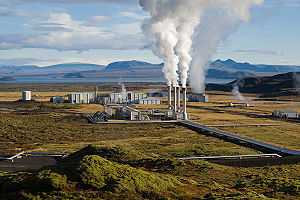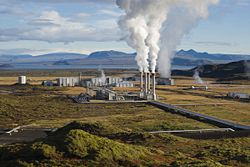
Not many people feel comfortable having power plants, oil refineries, or hydro-electric dams in their backyard. But, how about having a well in your neighborhood? A report released at the Massachusetts Institute of Technology calls for the drilling of more wells as a solution to the world’s energy crunch. Not the drilling for oil or water, but rather for rock, hot rocks, that is. Geothermal energy is one of the most environmentally friendly means of producing much needed electrical energy and it can be accessed by almost every country.
If enough deep wells were drilled in the U.S., the MIT report claims that 27 trillion kilowatt-hours of energy (the total consumed by the U.S. in 2005) could be accessed. Even better, it was estimated that the U.S. could be provided with enough energy to support its current rate of use for the next 2,000 years, thus ensuring energy security for the nation.
The energy supply works by simply pouring hot water onto earth-warmed rocks and using the generated steam to turn turbines. The turbines then generate the electricity. The panel believes that “by any calculation, this is an extremely large resource that is technically accessible to us right now”, according to the lead author, Jefferson Tester. Our existing technology is capable of producing the geothermal plants and “there’s never going to be a limitation on our ability to expand this technology because of the limits of the resource.”
Since the shape of our world is spherical, every country on the planet should be able to access this energy resource. A significant benefit is the reduction in levels of greenhouse gases or dangerous waste produced by traditional energy generating techniques. The adoption of electric cars and other electric motors over petroleum based devices points to more reasons to boost geothermal production and at the same time reduce greenhouse gas emissions.
One obbvious caveat is the danger of earthquakes and the damage they could do to the drilled wells. Nevertheless, the risk is well worth facing since earthquakes can just as easily wreak havoc on our current power plants and, particularly in the case of nuclear plants, cause significant damage beyond that of the plant itself.
The need for oil would not vanish entirely since it is used in the making of numerous products from asphalt roads and tires to plastics and preservatives, but the benefits of geothermal remain as clear as the water in a backyard well.
– Additional Resources: The Future of Geothermal Energy by MIT (PDF)
Michael Little works in analytical chemistry and has almost 20 years experience in the research based pharmaceutical industry. Michael resides in Laval, Quebec, with his wife and three children. Michael has written occasional science articles for GNN since 2007.




















